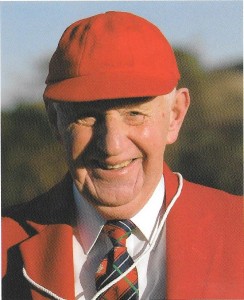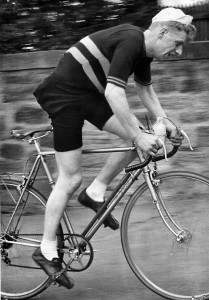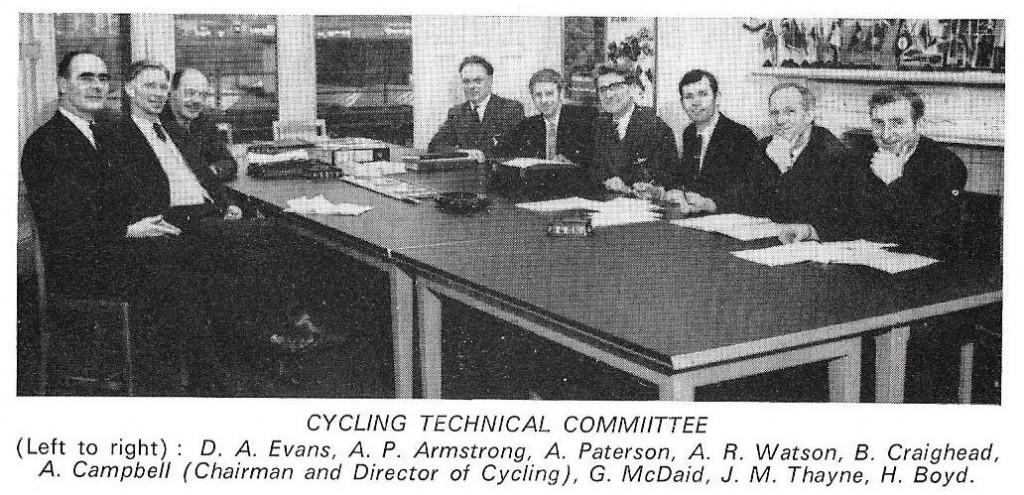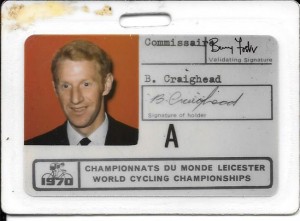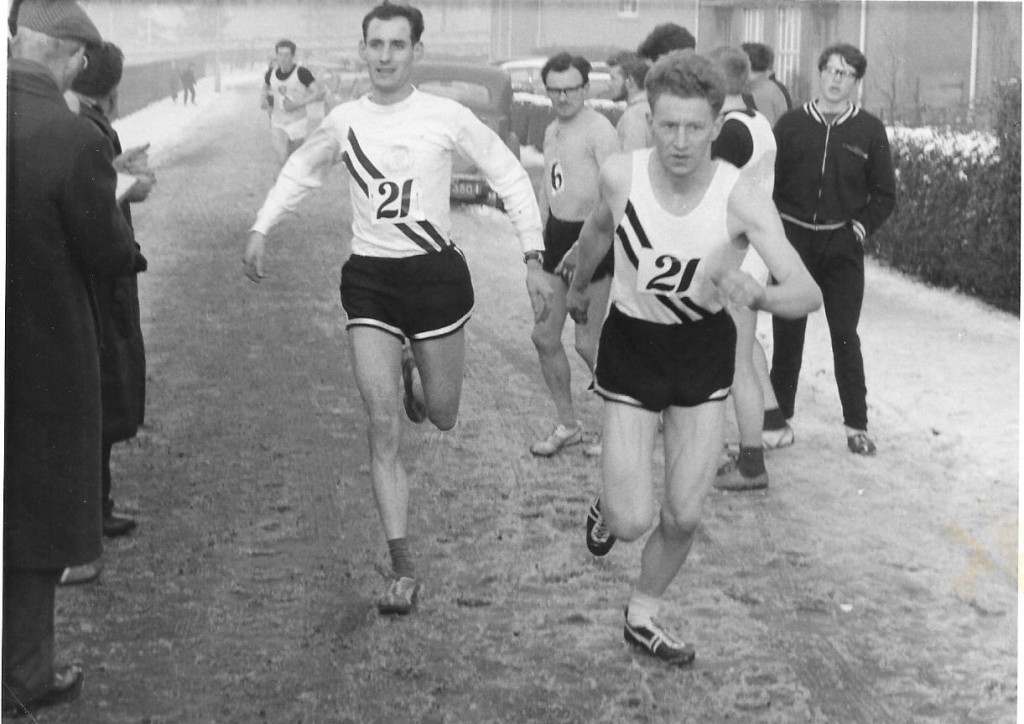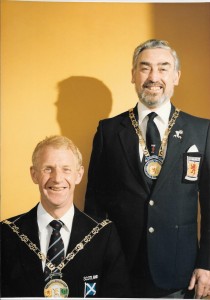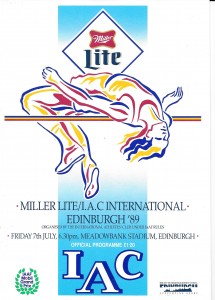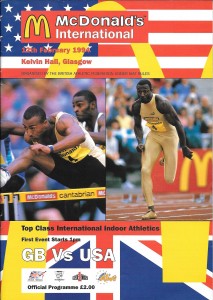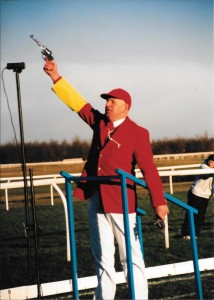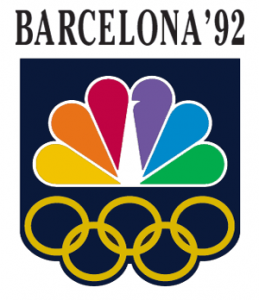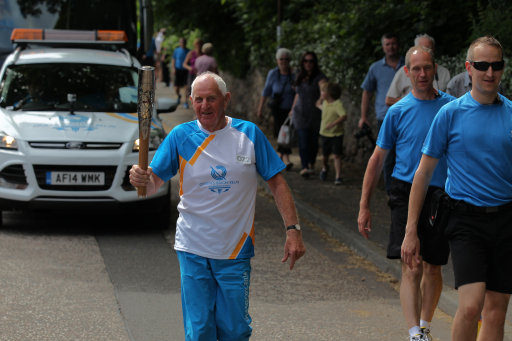Barry Craighead is one of the best known, best liked and most respected figures in Scottish athletics. Known to most of today’s athletes as a starter, he has in his career been a top class cyclist, a runner with Edinburgh AC, an administrator, and an official operating to the highest international standard.
Many very good Scottish athletes such as John Kerr, Hugo Fox and Hugh Mitchell started out as cyclists. Several athletes have turned to cycling too but few have achieved as much as Barry has. He was a cyclist for 18 years and a good one at that. He won the Army cycling championships when he was doing his national service and rode for the Army in the Tour of Britain race. We have a gallery of some of Barry’s souvenirs linked to this profile which contains some evidence of this. Seeing himself mainly as an endurance cyclist cyclo-cross competitor, in 1958 he covered over 235 miles in 12 hours on the bike, in 1959 aged 21 he won the Scottish Cyclo-Cross championship and there is also in the gallery a certificate he received when he finished third in the East of Scotland Championship after covering distances of 25, 50, 100 Miles and 12 hours at an average speed of over 21 mph.
Barry became involved in the organisation and administration of cycling and in 1970 was a member of the Cycling Technical Committee for the Commonwealth Games as well as being involved in athletics at the same Games. Indeed, such was his enthusiasm that he remained on the Commonwealth Games organising Committee for both sports – 12 years for cycling and 15 years for athletics.
Barry was also the first Scot to become a Commissaire – an official in competitive cycling who equates pretty well to that of referee at an athletics meeting: he supervises the organisation of the race, briefing the riders and officials, checking that all equipment complies with regulations, is responsible for resolving disputes and complaints and so on. In 1970 after the Games at Meadowbank, he acted in that capacity at the World Championships in Leicester. A talent that probably nobody in athletics knows about, is that of cycle wheel changing – read on.
“When the Scottish Milk Race sets of from Glasgow next Tuesday, the 52 world class cyclists competing will be relying on one of the most important men behind the scenes to keep their wheels turning – Barry Craighead from Edinburgh. Service operator Barry will be responsible for on-the-road repairs during the 5-day 55-mile event aided by a team of six cycle mechanics. Barry holds the world’s record for a complete wheel change – 23 seconds . The spare parts for the race could fill a cycle shop but competitors will be hoping they won’t be needed.” The article continues but the important part for me illustrates another of his talents.
While he was in the Army with cycling as his real competitive sport, he started cross-country running as a means of getting fit for cyclo-cross. He ran well, won the Scottish Army championship and started to take running a bit more seriously. On demob from the army he joined Edinburgh Athletic Club – again the aim was to get fit for cyclo-cross events. He always saw himself as an endurance cyclist. Running, however, increased in importance. Barry only ever had the one club – Edinburgh AC – and he raced in their colours in many races such as the Ben Nevis and other hill races, road races, the Musselburgh Festival and the National at Hamilton. On the track he ran in the steeplechase – at Westerlands in the SAAA Championship in a field of 12 runners, he went to the front with a lap to go and then caught his spikes in the water jump barrier, tumbled into the water, and that was the end of the race for Barry. On occasion when the club was short of a runner, he turned out in the 800m. Others training at the same time were Eric Fisher and John Fairgrieve, both very active in Scottish athletics and known throughout the country. Doug Gillon, athletics journalist, was also a member of Edinburgh AC at this time and says:
His running career merged into his career as an official and eventually the officiating took over.
Barry taking over in a relay for Edinburgh Athletic Club:
(Note Bertie Cox of Greenock Glenpark Harriers in the back ground, and Jim Keenan who started with Springburn Harriers before moving to EAC)
His running career merged into that as an official which eventually took over. When he first became an official, there were not many starters about and his mentor was the highly respected Bill Fulton, and there was also help and encouragement from the legendary Fred Evans. His first event as a starter was at a Forth Valley League match at Newhaven track in Edinburgh and he ‘served his time’ and honed his skills at many local events, before becoming a chief starter eleven years later. Barry’s career as an official developed, and in 1971 he was appointed Chief Starter for Scotland. A Chief Starter is qualified to take charge at all events of all standards up to and including Olympic Games. At that time there was a Chief Starter and others graded 1,2 or 3. There were approximately 25 starters in the country then. But starting, although the main focus of his involvement in the sport, was not his only involvement.
As with all enthusiastic and talented individuals, he was soon on to the EAC committee and in 1975 was elected to the East District Committee of the SAAA. A contemporary there of Oliver Dickson and Bob Greenoak he became District Secretary – a position which he still holds in 2015. One of the genuine characters of the sport and a highly respected and capable man, Barry’s friend Claude Jones was a member of the national cross-country union and by chance they became Presidents of their respective bodies in season 1983-84 – Claude the SCCU and Barry the SAAA. This was the first time that two men from the same club had held both offices simultaneously.
Meanwhile his progress as the country’s top starter continued and grew even more. He was soon officiating at 48 – 50 events a year, sometimes over 50 races at a meeting. He worked on the hill race circuit, at road and cross-country races but mainly in track, including some highland games meetings. Not only was he in demand for national and district championships, he was officiating at British events. In 1986 he was chief starter at the Commonwealth Games in Edinburgh which he counts as a great experience. It is really impossible to list here all the internationals in which Barry has started but two will serve as examples of the standard. At Meadowbank in July 1989, he was chief starter at the Miller Lite/IAC International meeting where runners such as Merlene Ottey, Kris Akabusi, Paul Ereng, Johnny Gray, Linford Christie, Denis Mitchell, Said Aouita, David Moorcroft and Sally Gunnell were all competing, and at Glasgow’s Kelvin Hall in the McDonald’s International in February 1994, there were Kirsty Wade, Bev Kinch, Colin Jackson, Linford Christie, Jonathan Edwards (60m invitation), Katherine Merry, and others of similar calibre.
Between those events, Barry officiated at the Olympic Games in Barcelona, the only Scottish official to do so. He had to go to Spain the year before the Olympics for three weeks to be checked for skills and competence, etc but also so that he could run the rule over the situation there. Mainly involved in the rowing events, it was the first time in history that electronic timing had been used for rowing events. The big events were happening with ever increasing frequency.
Barry has operated at local, Scottish, British, European, Commonwealth and Olympic levels. A record that not many can match.
A list of events where he has been a key official would include –
* Chief starter at the Commonwealth Games in 1986;
* Chief starter at the World Cross-Country Championships in Edinburgh in 2008;
* Chief starter for the European Cross-Country Championships at Holyrood for several years;
* Chief starter for European Championships for People with a Disability;
* Chief starter at the Transplant Sport UK 3oth Anniversary event in 2007;
* Starter at numerous international fixtures – note the examples above.
* Among the top athletes who have ‘come under his gun’ but not noted already are Allan Wells, John Walker, Ed Moses, Mary Peters, Michael Johnston, Calvin Smith, Carl Lewis, Sydney Maree, Seb Coe, Zola Budd, Liz McColgan, Yvonne Murray, … in fact virtually all of the top athletes for several decades would be included in any list pretending to be comprehensive. When Oscar Pistorius set a world record in Manchester in 2010, Barry was the starter and as such had sign the record application form.
Some incidents stand out – as when he recalled the field at the International Cross-Country race in Edinburgh in 2008! When asked about it he simply says that there was no doubt that the Frenchman and the Spaniard broke the line.
Barry still operates at the National cross-country championships, helps organise and officiates on the day at the Traprain Hill Race and at the professional New Year Sprint. One of his remarks, quoted in an article in ‘My Race’, a Scottish running magazine, was “Starting races for youngsters is most enjoyable … it’s great to see 300 kids in a line.” Not surprisingly he has officiated at the Scottish Primary Schools cross-country championships since they started in the 1980’s.
But people like Barry are seldom involved in one role in any sport and Barry has proved himself a more than adequate administrator. Currently on his club committee where he is Honorary President of Edinburgh Athletic Club in succession to Donald Gorrie, while Moira McGuire is chairman and working club president, having taken over from Barry who has been twice elected as President and Chairman of the club..
But there were several careers going on at once as far as Barry and athletics was concerned. His position on the SAAA led to further international experience as a team manager. In this capacity, he took a Scottish team to Budapest for an international fixture. As a member of the Hill Running Commission set up when the SAAA was re-formed as the Scottish Athletics Federation, he was their East Area representative on the Federation from the very start. In this capacity he managed hill running teams in Austria, Italy and Zermatt in Switzerland.
There have been other tasks undertaken too – many of long duration. Barry looks after Scholarships and Grant Applications for Fife, East and West Lothian which while not as numerous as in the past, is important and not taken lightly. When the Thistle Award Scheme started up in Frank Dick’s time as National Coach, Barry and Jeannette Heggie were involved right from the start. It was a job that was to carry on for 24 years.
*
Like most of the officials of his generation, Barry had a working day well away from the sport that he loved and that was taking ever increasing amounts of his time. Barry started out as a joiner but for the last 25 years he worked for the Northern Lighthouse Board which meant travelling all over Scotland and to the Isle of Man as well. Back in East Linton, and a member of the Dunpender Community Council for 14 years, he is highly respected in the community where he has several responsibilities – he looks after the Community Hall, he is on the Police Committee (CAAP), helps with school sports meetings and works with the schools on Fairtrade Projects. The organisers of the Musselburgh Riding of the Marches Festival are organising and exhibition to encourage children’s sport participation and will have Barry’s starter’s uniform and memorabilia on display.
Starters are such a common part of the scenery at athletics meetings that they are seldom given much thought. If we take a minute and look at the demands made on them we look first at the most dramatic item of equipment in the entire arena – the gun. The starter is not allowed to travel on public transport to the meeting and has to park his car as close to the entrance to the arena as possible. He has of course to pay for the gun and the ammunition himself. How much does a good gun cost? Around £300, and remember that most starters have at least two because they often have to fire a recall gun. He has to purchase his own guns and keep them safe. The starter’s uniform until recently was red blazer, white shirt, tie, white trousers and white trainers, all purchased by the starter. The rules have now been relaxed with dark trousers being worn with a red polo shirt, although Barry still likes to wear the red blazer at track, cross country and highland games He also has to purchase wet weather gear which is essential in Scotland. On occasion Barry has been mildly twitted about wearing the full rigout to cross-country or hill races but that is what starters wear. They wear it for a reason and there is no real reason NOT to have it at any meeting.
The reduced number of starters in the country gives Barry cause for concern. There are now only 10 – 12 active starters. When asked why this is so, he thinks that it is partly because of the increased bureaucracy but also because of the expense. Remember that the new starter has to buy his own uniform, buy his own gun, buy his own ammunition. There is a small fee from meeting organisers but that is small compared with what the new official has to pay out in hard cash to start with. Barry does not make a big issue out of the expense, nor does any other official that I know, but it would be good were one of the sponsors of the sport take on the responsibilities of supporting the legitimate expenses of this dedicated body of men and women. Field event officials for instance are seen with weighty bags of equipment which is necessary for efficient organisation but which is often in short supply or faulty at the venue, timekeepers have to have appropriate watches, etc. These and other genuine expenses, including appropriate clothing should maybe have some priority in spending plans.
However, Barry’s contribution to the sport has been recognised by various bodies and the main awards have been
1996 Scottish Sports Council National Service to Sport Award
2008 Scottish Athletics Lifetime Achievement Award
2014 British Athletics Award
For the last one, the citation read that it was 40 years service – when in fact he had 54 years service behind him at that point. He was also given the honour of carrying the Queen’s Baton for the Commonwealth Games in 2014 as the representative of East Linton.
Just reward for a man who has been cyclist, athlete, administrator and official; as an official he has been starter,marksman, track judge, commissaire; he has filled the role of international team manager and also held various roles at club, district and national level. Like others who have kept and keep the sport running, he demonstrates a level of efficiency and commitment across several roles without demur. You can see all Barry’s pictures at this link
Barry carrying the baton through Dirleton, East Lothian
